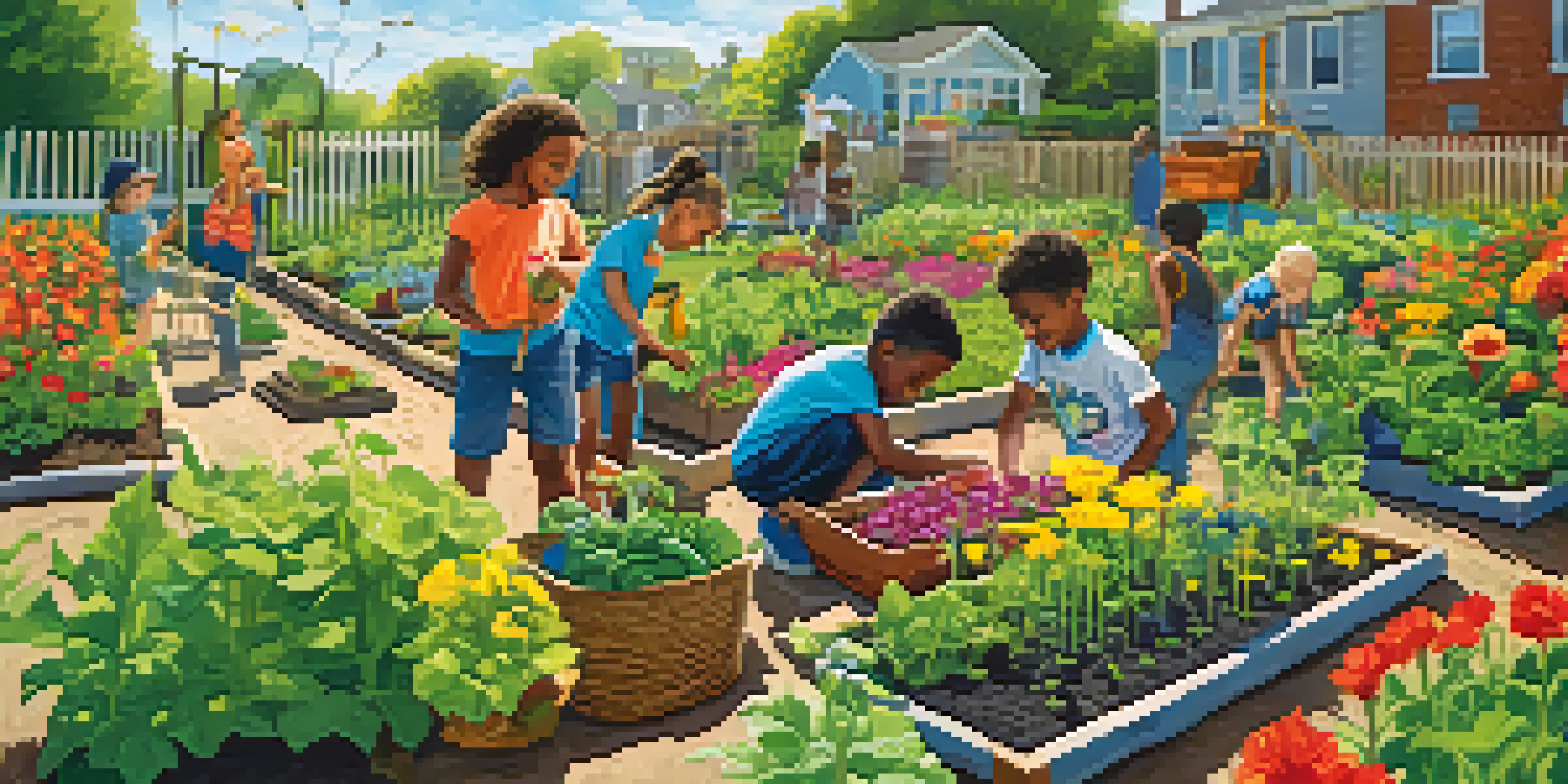Engaging Youth in Community Gardening for Health Benefits

Why Community Gardening Matters for Youth Health
Community gardening is more than just growing plants; it's about fostering a healthy lifestyle among youth. Engaging in gardening activities can significantly improve physical health by encouraging outdoor exercise and promoting nutritious eating habits. By planting, nurturing, and harvesting their own food, young people develop a deeper understanding of nutrition and well-being.
To plant a garden is to believe in tomorrow.
Additionally, gardening serves as a natural stress reliever. The act of tending to plants can help reduce anxiety and improve mood, which is especially beneficial for youth facing academic or social pressures. Connecting with nature offers a sense of calm and purpose, crucial for mental health during formative years.
Moreover, community gardening provides an opportunity for social interaction. Youth can collaborate with peers, build friendships, and learn teamwork skills, which are essential for personal development. This social aspect enhances the overall benefits of gardening, making it an enriching experience.
Building Skills Through Gardening Activities
Participating in community gardening equips youth with valuable life skills. From planning a garden layout to understanding the growth cycle of plants, these hands-on experiences teach critical thinking and problem-solving. Such skills are not only applicable in gardening but can also translate into other areas of life, such as academics and future careers.

Moreover, gardening instills a sense of responsibility. When youth care for their plants, they learn the importance of commitment and nurturing. This sense of duty fosters a connection to the environment, promoting sustainability and encouraging them to take care of their surroundings.
Gardening Boosts Youth Health
Engaging in community gardening promotes physical health, mental well-being, and healthy eating habits among youth.
Additionally, community gardening can introduce youth to basic agricultural techniques and environmental science. These lessons can spark interest in science, technology, engineering, and mathematics (STEM) fields, inspiring future career paths. This blend of education and fun makes gardening an appealing activity for young learners.
Promoting Healthy Eating Habits Through Gardening
One of the most significant benefits of community gardening is its ability to promote healthy eating habits. When youth grow their own fruits and vegetables, they are more likely to try new foods and incorporate them into their diets. This hands-on experience breaks down barriers to healthy eating, making nutritious choices more appealing.
Gardening adds years to your life and life to your years.
Gardening also provides an opportunity to educate youth about the nutritional value of what they grow. Workshops and discussions around food preparation can enhance their understanding of healthy eating, allowing them to make informed decisions about their meals. As they taste the fruits of their labor, they often develop a preference for fresh produce over processed foods.
Furthermore, community gardens can serve as a platform for cooking demonstrations and nutrition classes. These interactive sessions empower youth with the knowledge and skills to prepare healthy meals, reinforcing the connection between gardening and a healthy lifestyle. By fostering an appreciation for food, gardening can lead to lifelong healthy eating habits.
Fostering Community Connections through Gardening
Community gardening creates a sense of belonging and fosters connections among youth and their neighbors. As they work together in the garden, participants build relationships that extend beyond gardening, helping to create a supportive community. This sense of community can be particularly beneficial for youth who may feel isolated or disconnected.
Gardening also provides a platform for cultural exchange. Participants from diverse backgrounds can share their gardening techniques and recipes, enriching the community's cultural fabric. This sharing of knowledge and experiences promotes inclusivity and understanding among different groups, which is vital for community cohesion.
Skills Development Through Gardening
Participation in gardening activities equips youth with critical life skills, such as responsibility, teamwork, and problem-solving.
Additionally, community gardens often become spaces for local events and activities. From harvest festivals to educational workshops, these gatherings bring people together, creating opportunities for social interaction and collaboration. Such events not only enhance community spirit but also encourage youth to take pride in their contributions.
Environmental Awareness and Stewardship Through Gardening
Engaging in community gardening helps youth develop a sense of environmental stewardship. By working with plants and understanding their growth cycles, young people become more aware of the ecosystems around them. This hands-on experience fosters a connection to nature that can inspire lifelong environmental advocacy.
Gardening also provides a practical education on sustainability. Youth learn about composting, organic gardening practices, and water conservation, equipping them with the knowledge to make eco-friendly choices. These lessons are essential in combating environmental challenges and promoting a sustainable future.
Moreover, community gardens can act as biodiversity hotspots in urban areas. By planting a variety of species, youth contribute to local ecosystems, supporting pollinators and other wildlife. This engagement not only enhances their understanding of environmental issues but also empowers them to take action in their communities.
Integrating Gardening into Educational Programs
Integrating gardening into educational programs can enhance learning experiences for youth. Schools and community organizations can create garden-based curricula that incorporate science, math, and even art. This hands-on learning approach makes education more engaging and relevant to students' lives.
For instance, students can learn about plant biology while observing their own garden's growth. They can measure plant height or calculate the yield of their crops, reinforcing math skills in a practical context. This integration fosters a love for learning and encourages critical thinking.
Community Connection and Belonging
Community gardening fosters social interactions and cultural exchanges, creating a sense of belonging among youth and their neighbors.
Additionally, gardening projects can promote teamwork and leadership skills. As youth collaborate on garden tasks, they learn to communicate effectively, delegate responsibilities, and work towards common goals. These skills are invaluable for their future endeavors, whether in school or the workplace.
Overcoming Challenges in Youth Gardening Initiatives
While community gardening offers numerous benefits, there can be challenges in engaging youth. Limited resources, such as funding or access to land, can hinder the establishment of gardening programs. Overcoming these obstacles requires creative solutions and community involvement to ensure sustainability.
Moreover, maintaining youth interest can be a challenge. To keep young participants engaged, it's essential to incorporate variety and innovation into gardening activities. Offering workshops, themed planting days, or even garden competitions can keep the excitement alive and encourage continued participation.

Finally, addressing the diverse needs and interests of youth is crucial. Programs should be adaptable and inclusive, allowing participants to express their creativity and preferences within the gardening framework. By fostering an environment where youth feel valued and heard, community gardening can thrive as a meaningful and impactful initiative.
The Long-Term Impact of Youth Engagement in Gardening
The long-term impact of engaging youth in community gardening extends far beyond the garden itself. As young people develop skills and knowledge related to gardening, they carry these lessons into adulthood, promoting lifelong healthy habits. The benefits they gain can lead to improved physical and mental health throughout their lives.
Additionally, youth who participate in gardening are more likely to become advocates for sustainability and environmental stewardship. This early exposure to gardening can shape their values and encourage them to contribute positively to their communities. They become role models for their peers, inspiring others to appreciate the importance of healthy living and environmental care.
Ultimately, community gardening cultivates not only plants but also future leaders. By instilling a sense of responsibility, community connection, and health awareness, these initiatives can create a ripple effect that transforms individuals and communities for generations to come. The legacy of youth engagement in gardening is one of empowerment and positive change.